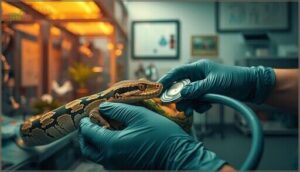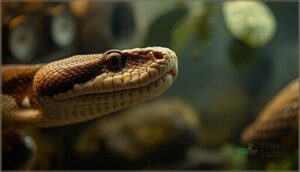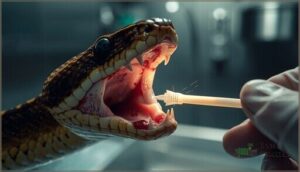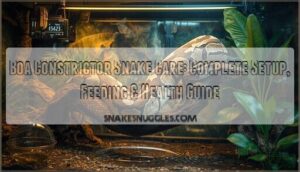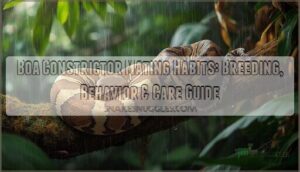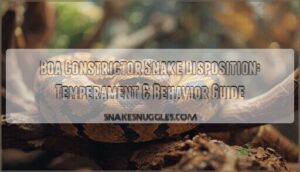This site is supported by our readers. We may earn a commission, at no cost to you, if you purchase through links.
Most boa constrictors won’t show obvious signs of illness until a condition has progressed beyond early stages. Your snake’s instinct is to hide vulnerability—a survival trait that makes recognizing health problems difficult without specialized knowledge.
A respiratory infection can advance from subtle wheezing to life-threatening pneumonia in days, not weeks. Finding qualified boa constrictor vet recommendations before an emergency strikes means you’ll know exactly where to turn when your snake exhibits open-mouth breathing, refuses meals across multiple feedings, or develops the patchy shed that signals underlying metabolic issues.
The right veterinarian brings species-specific diagnostic skills that general practitioners often lack, from interpreting blood chemistry panels to recognizing inclusion body disease in its earliest stages.
Table Of Contents
- Key Takeaways
- When to Seek a Boa Constrictor Vet
- How to Find a Qualified Reptile Veterinarian
- What to Expect During a Vet Visit
- Common Health Issues Boa Vets Address
- Essential Diagnostic Tests for Boas
- Frequently Asked Questions (FAQs)
- How much do vet visits cost for snakes?
- Do snakes need regular vet visits?
- What is the life expectancy of a boa constrictor?
- What should I bring my snake to the vet in?
- How do you care for a boa constrictor?
- Are boa constrictors suitable pets?
- Do boa constrictors require vitamins?
- What is the size of a boa constrictor?
- Do boa constrictors require a tank?
- What are the different types of boa constrictors?
- Conclusion
Key Takeaways
- Boas hide illness until conditions become critical health issues, so establishing a relationship with a qualified reptile veterinarian before emergencies occur ensures you’ll have immediate access to specialized diagnostic skills when respiratory distress, feeding refusal, or shedding problems appear.
- Annual wellness exams create health baselines that allow vets to detect metabolic issues, parasites, and early-stage diseases through blood work and physical assessment before symptoms become visible to owners.
- Finding an experienced boa veterinarian requires verifying credentials through state boards, confirming case-specific experience with boa constrictors, and seeking recommendations from breeders who can provide references for practitioners skilled in reptile medicine.
- Emergency symptoms including open-mouth breathing above 30 breaths per minute, neurological signs like seizures or head tilts, severe dehydration with sunken eyes, and uncontrolled bleeding demand immediate veterinary intervention to prevent life-threatening complications.
When to Seek a Boa Constrictor Vet
Recognizing when your boa needs veterinary attention can mean the difference between a quick recovery and a serious health crisis. Some symptoms require immediate care, while others signal it’s time to schedule a checkup.
Learning to spot behavioral symptoms of a sick snake early helps you act quickly before minor issues become emergencies.
Here’s what you need to watch for to keep your snake healthy.
Warning Signs of Illness
Vigilance is your first line of defense in Boa Constrictor Health and Veterinary Care. Watch for respiratory issues like wheezing or open-mouth breathing, skin lesions including abscesses or discolored scales, and appetite changes spanning multiple feedings.
Behavioral shifts such as lethargy or aggression, alongside shedding problems like patchy or incomplete sloughs, indicate common ailments requiring veterinary assessment. Recognizing these signs of illness early ensures prompt intervention.
Be aware that sudden changes in health can sometimes reflect serious illness warning signs that merit immediate attention.
Emergency Symptoms to Watch For
Some signs of illness demand emergency response and critical care. Recognize respiratory distress through gasping, open-mouth breathing above 30 breaths per minute, or wheezing.
Severe dehydration presents with sunken eyes and tacky mouth. Neurological signs like seizures, head tilts, or unresponsiveness require immediate veterinary attention.
Severe dehydration, neurological symptoms, and unresponsiveness in boa constrictors demand immediate veterinary intervention to prevent life-threatening complications
Uncontrolled bleeding, facial swelling, or shock signals life-threatening reptile health issues needing urgent evaluation by your vet. Understanding the importance of a quick emergency response can greatly improve outcomes in critical situations.
Importance of Annual Checkups
Annual exams establish a health baseline, tracking your boa’s weight, length, and body condition over time. Preventive care through veterinary guidance catches respiratory infection and other reptile health issues before they escalate.
Disease screening via blood work and parasite checks reveals problems invisible to owners. Regular vet consultation ensures appropriate humidity levels, feeding schedules, and enrichment strategies support long-term wellness.
How to Find a Qualified Reptile Veterinarian
Not all veterinarians have the proper training or equipment to treat boa constrictors properly.
Finding a qualified reptile vet requires specific steps to verify expertise and guarantee your snake receives appropriate care.
The following methods will help you locate an experienced professional in your area.
Locating Reptile and Exotic Animal Vets
Finding the right care provider requires strategic use of Reptile Care Networks and Exotic Pet Specialists directories.
Prioritize veterinarians with documented experience in boa constrictor care, as outlined in this comprehensive boa constrictor pet care guide.
Start with these Vet Location Tips:
- Search within 25 miles to reduce transport stress and enable Emergency Contact Lists access
- Review Animal Hospital Reviews focusing on boa constrictor case experience
- Consider Swiftail Exotic Telemedicine Veterinary Services for remote Reptile Health Management and Exotic Pet Veterinary Care consultations when immediate Swiftail Vet telemedicine guidance is needed
Verifying Credentials and Experience
Credential Checks start with License Verification through your state veterinary board to confirm active standing and specialty certifications in reptile veterinary care.
Request Experience Validation by asking about annual boa case loads and specific procedural knowledge during your veterinary consultation.
Background Screening includes Reference Reviews from recent clients who’ve used Swiftail Exotic Telemedicine Veterinary Services or in-person veterinary medicine for reptile veterinary care, providing veterinary advice you can trust.
Asking for Recommendations From Breeders and Owners
Where do you start when choosing a boa vet? Breeder Interviews offer targeted vet referrals and firsthand veterinary advice on snake health issues.
Request contact details for at least two veterinarians experienced in reptile husbandry and boa constrictor care.
Owner Testimonials through reference checks reveal breeder reputation and ongoing support quality. Verify that breeders provide verifiable contacts who’ll discuss boa constrictor husbandry challenges honestly.
What to Expect During a Vet Visit
Your first vet visit sets the foundation for your boa’s long-term health.
The appointment usually lasts 30 to 45 minutes and covers several key areas.
Understanding what happens during each stage helps you prepare and ensures nothing important gets overlooked.
Initial Consultation and Medical History
Your vet begins each visit with a thorough owner interview and medical questionnaire. You’ll provide detailed husbandry information from your boa constrictor care sheet, including enclosure specs, temperature gradients, and feeding routines.
The veterinary assessment covers previous illnesses, medication history, and recent behavioral changes. This health screening process establishes baseline data essential for diagnosing common boa constrictor health issues and guiding effective reptile health and disease management.
Physical Examination and Body Condition Assessment
Your veterinarian performs a complete hands-on exam to evaluate muscle mass along your boa constrictor’s spine and ribs.
Body scoring determines if your snake is underweight, healthy, or obese by palpating fat coverage at the tail base and checking for protruding pelvic bones.
This systematic health check tracks weight management trends and detects subtle body language cues signaling illness before shedding or behavioral problems appear.
Skin, Weight, and Respiratory Evaluation
Your vet examines skin for lesions, retained shed on eyes or digits, and signs of infection requiring intervention. Weight monitoring detects sudden drops exceeding 10 percent or abnormal growth patterns.
Respiratory health checks include:
- Listening for wheezes or gurgling sounds
- Observing open-mouth breathing
- Checking nasal discharge
- Evaluating breathing rhythm
- Evaluating chest symmetry
These assessments catch respiratory infections before body condition deteriorates.
Common Health Issues Boa Vets Address
Boa constrictors face several health challenges that require veterinary attention throughout their lives.
Some conditions develop slowly due to environmental factors, while others appear suddenly and demand immediate care. Understanding these common issues helps you recognize when your boa needs professional treatment.
Respiratory Infections and Breathing Problems
Respiratory infections rank among the most serious threats to boa constrictor health. You’ll notice breathing difficulties through open-mouth respiration, audible wheezing, or nasal discharge.
Infection prevention depends on proper humidity control and enclosure ventilation. Your vet will implement respiratory therapy including antibiotics and airway management techniques. Early intervention is critical—respiratory infections progress rapidly without veterinary care, making prompt diagnosis essential for snake health.
Parasites, Mites, and Internal Worms
Parasites pose persistent threats requiring veterinary intervention and thorough hygiene protocols. Your vet diagnoses mite removal needs through skin scrapings, while fecal exams detect internal worms compromising snake health.
Effective parasite control involves:
- Environmental decontamination – Clean enclosures thoroughly to eliminate snake mites and prevent reinfection
- Targeted antiparasitic therapy – Veterinary-prescribed treatments guarantee worm prevention without disrupting gut flora
- Quarantine protocols – Isolate new boas before introduction to maintain reptile hygiene standards
Regular fecal screenings detect infections early, preventing complications like constipation impaction.
Mouth Rot, Stomatitis, and Shedding Issues
Mouth infections develop when bacteria invade oral tissues through feeding injuries or shedding problems. Stomatitis causes redness, swelling, and cottage cheese-like discharge along the gum line. You’ll notice foul breath and reduced appetite signaling oral health deterioration.
Low humidity worsens shedding issues, trapping debris that fuels bacterial diseases. Your vet cultures lesions to prescribe targeted antibiotics, preventing systemic spread in your boa.
Inclusion Body Disease and Viral Conditions
Inclusion Body Disease remains one of the most devastating viral conditions affecting boas. Reptarenavirus research confirms neurologic signs like tremors, head tilting, and progressive weakness characterize this untreatable infection. Your vet uses PCR testing and clinical assessment for IBD management.
- Viral transmission occurs through bite wounds and contaminated secretions
- Disease prevention requires strict quarantine protocols for new arrivals
- Obesity and constipation/impaction complicate supportive care efforts
- Reptile health and disease monitoring through veterinary medicine remains critical
Essential Diagnostic Tests for Boas
Your vet will rely on diagnostic tests to identify health problems that aren’t visible during a physical exam. These procedures help detect parasites, infections, organ dysfunction, and other conditions that require laboratory analysis or imaging.
Understanding what each test involves will prepare you for your boa’s veterinary visits and help you recognize when certain diagnostics are necessary.
Fecal Exams for Parasite Detection
Fecal Collection and Stool Analysis form the foundation of parasite detection in your boa constrictor. Your vet performs a Microscopic Exam on fresh samples to identify intestinal health threats affecting Snake Health and Veterinary Care.
Flotation and sedimentation techniques reveal different parasite types, improving diagnostic accuracy in Reptile Health and Disease management.
| Test Method | Primary Purpose |
|---|---|
| Flotation | Detects roundworms and pinworms |
| Sedimentation | Identifies heavier parasite eggs |
| Direct Wet Mount | Reveals motile organisms quickly |
Blood Work and Chemistry Panels
Blood Panel evaluation provides critical insight into your boa constrictor’s internal health status. Chemistry Tests measure Electrolyte Balance, kidney function, liver enzymes, and glucose to detect Metabolic Trends before visible symptoms appear.
Your reptile veterinarian uses these Diagnostic Markers to establish baseline values:
- Sodium and potassium levels reveal hydration status
- Calcium and phosphorus assess metabolic bone health
- BUN and creatinine evaluate kidney function
- ALT and AST screen liver condition
- Glucose monitors energy balance
Abnormal results guide targeted treatment in Snake Health and Veterinary Care.
X-Rays and Imaging Procedures
Diagnostic Imaging reveals internal conditions invisible during physical examination. Your reptile veterinary medicine specialist uses radiography to detect fractures, organ abnormalities, foreign bodies, and respiratory disease through x-ray interpretation while following radiation safety protocols.
| Imaging Technique | Primary Use | Common Findings |
|---|---|---|
| Lateral thorax view | Lung assessment | Pneumonia patterns |
| Dorsoventral abdomen | Digestive tract | Impaction or obstruction |
| Skeletal survey | Bone integrity | Fractures or deformities |
| Contrast studies | Organ visualization | Vascular or GI anomalies |
| Targeted positioning | Specific injuries | Swelling evaluation.” |
Medical imaging aids accurate diagnosis in boa constrictor health and snake care and maintenance.
Skin Scrapings and Cultures
Your veterinarian collects surface material from skin lesions to diagnose fungal infections and parasite detection through microscopy analysis. Suspect issues when abnormal shedding or dermatological changes appear alongside respiratory disease or constipation-impaction in boa constrictor illnesses and symptoms.
- Superficial scraping captures mites and surface organisms
- Deep scraping reveals fungal elements within follicles
- Culture techniques on Sabouraud agar identify pathogens
Reptile veterinary medicine combines microscopic examination with incubation protocols.
Frequently Asked Questions (FAQs)
How much do vet visits cost for snakes?
Standard office consultations run 60 to 120 dollars, though exotic animal clinics often charge higher baseline fees. Emergency visits can reach 150 to 300 dollars or more, with diagnostic tests billed separately.
Do snakes need regular vet visits?
Yes, boas need at least one annual wellness exam with a reptile-competent veterinarian. Regular checkups catch parasites and metabolic issues early, even when your snake shows no symptoms.
Preventive care ensures long-term reptile wellness.
What is the life expectancy of a boa constrictor?
Your boa constrictor can live 25 to 30 years in captivity with proper care, though some reach 40 years.
Life expectancy depends on habitat quality, nutrition, veterinary attention, and prompt treatment of health issues.
What should I bring my snake to the vet in?
You’ll need a ventilated carrier with secure latches, lined with substrate like paper towels. Choose size appropriateness carefully—enough room to coil, not thrash.
Temperature control during transport prevents stress-related health complications.
How do you care for a boa constrictor?
How does a thriving boa constrictor begin? You’ll need proper habitat design with thermal regulation, carefully timed feeding schedules for nutritional needs, consistent health monitoring, routine enclosure maintenance, gentle snake handling, and disease prevention through attentive boa care.
You’ll need to consider all these factors to ensure your boa constrictor thrives.
Are boa constrictors suitable pets?
They’re manageable for experienced reptile owners who can provide proper boa constrictor habitat, specialized diet requirements, and longterm pet commitment.
Space needs and lifespan commitment—20 to 30 years—make them unsuitable for complete beginners.
Do boa constrictors require vitamins?
Whole prey delivers a complete nutritional package, so vitamin supplements aren’t usually necessary if you’re feeding appropriately sized frozen-thawed rodents.
Bones and organs provide calcium and essential nutrients your boa needs to thrive.
What is the size of a boa constrictor?
Adult boa constrictors reach six to ten feet, with females usually larger than males.
Neonates measure twelve to eighteen inches at birth. Size variance depends on subspecies, genetics, and husbandry practices affecting snake growth.
Do boa constrictors require a tank?
Like a secure vault for precious cargo, your boa constrictor enclosure requirements demand careful planning.
You need a tank or custom snake habitat measuring at least 4 feet by 2 feet, with proper enclosure size increasing as your snake grows.
What are the different types of boa constrictors?
Several boa constrictor species exist, including Red Tail Boas, Columbian Boas, Argentine Boas, and Dumarils Boas. Each exhibits distinct size, coloration, and habitat requirements.
Boa morphs add further variety within these reptile species.
Conclusion
Your boa’s next shed could reveal the infection you didn’t catch early enough—or it could confirm that proactive care kept disease at bay. Establishing boa constrictor vet recommendations now, before symptoms escalate, transforms emergencies into manageable interventions.
The veterinarian you choose determines whether subtle weight loss becomes a diagnostic opportunity or a critical crisis. When respiratory distress appears at midnight, you won’t be searching directories—you’ll already know which number to dial.


